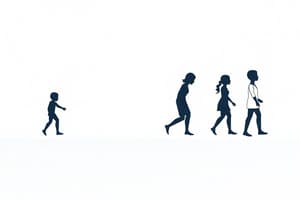Podcast
Questions and Answers
What is one key milestone of infancy?
What is one key milestone of infancy?
- Exploration of identity
- Establishing intimate relationships
- Crawling (correct)
- Logical thinking
At what phase of life do individuals begin to see a significant development of motor skills and language?
At what phase of life do individuals begin to see a significant development of motor skills and language?
- Infancy
- Late Adulthood
- Middle Adulthood
- Early Childhood (correct)
Which cognitive ability is enhanced during middle childhood?
Which cognitive ability is enhanced during middle childhood?
- Abstract thinking
- Attachment formation
- Problem-solving (correct)
- Physical maturation
What significant change occurs during adolescence?
What significant change occurs during adolescence?
What is a common focus during early adulthood?
What is a common focus during early adulthood?
What becomes a priority during middle adulthood?
What becomes a priority during middle adulthood?
Which phase is characterized by reflection on life experiences?
Which phase is characterized by reflection on life experiences?
What developmental task is commonly associated with adolescence?
What developmental task is commonly associated with adolescence?
Flashcards are hidden until you start studying
Study Notes
Phases of Life
-
Infancy (0-2 years)
- Rapid physical growth and development.
- Key milestones: crawling, walking, first words.
- Attachment formation with caregivers.
-
Early Childhood (2-6 years)
- Development of motor skills and language.
- Social skills begin to emerge: sharing, cooperation.
- Cognitive development: understanding of the world increases.
-
Middle Childhood (6-12 years)
- Enhanced cognitive abilities: logical thinking, problem-solving.
- Development of self-concept and identity.
- Importance of peer relationships and social interactions.
-
Adolescence (12-18 years)
- Physical changes: puberty and sexual maturation.
- Development of abstract thinking and moral reasoning.
- Exploration of independence and identity, potential for rebellion.
-
Early Adulthood (18-40 years)
- Establishment of personal and economic independence.
- Pursuit of intimate relationships and family formation.
- Focus on career development and personal goals.
-
Middle Adulthood (40-65 years)
- Reevaluation of life goals and achievements.
- Physical aging begins; health becomes a priority.
- Possible shifts in family dynamics (e.g., children leaving home).
-
Late Adulthood (65+ years)
- Reflection on life experiences and legacy.
- Increased focus on health and managing chronic conditions.
- Social interactions may decline, leading to potential isolation.
Key Concepts
- Developmental Tasks: Each phase has specific tasks that individuals are expected to navigate.
- Physical & Cognitive Changes: Each life phase involves unique physical and cognitive development.
- Social Influences: Relationships and social environments greatly impact each phase of life.
- Lifespan Perspective: Recognizes the importance of all phases in shaping the overall development of an individual.
Phases of Life
-
Infancy (0-2 years):
- Characterized by rapid physical growth and significant developmental milestones like crawling and walking.
- First words mark crucial language development, aiding communication with caregivers.
- Formation of attachments with caregivers is critical for emotional security.
-
Early Childhood (2-6 years):
- Development of motor skills enhances coordination and physical abilities.
- Social skills begin emerging, including sharing and cooperation, foundational for future relationships.
- Cognitive development accelerates, helping children understand their environment and the world around them.
-
Middle Childhood (6-12 years):
- Cognitive abilities enhance, enabling logical thinking and problem-solving skills.
- The self-concept begins to take shape, influencing how children perceive themselves.
- Peer relationships gain importance; social interactions become pivotal for emotional and social development.
-
Adolescence (12-18 years):
- Undergoes significant physical changes associated with puberty and sexual maturation.
- Development of abstract thinking and moral reasoning, enabling deeper understanding of ethics and beliefs.
- Exploration of independence, which may lead to identity crises and potential rebellion against social norms.
-
Early Adulthood (18-40 years):
- Focus on establishing personal and economic independence, paving the way for adult responsibilities.
- Intimate relationships and family formation become central themes.
- Career development and pursuit of personal goals are prioritized, impacting long-term aspirations.
-
Middle Adulthood (40-65 years):
- Period for reevaluating life goals and assessing achievements, leading to potential life changes.
- Beginning of physical aging prompts a focus on health and wellness.
- Family dynamics often shift, such as experiencing empty nesting when children leave home.
-
Late Adulthood (65+ years):
- Individuals reflect on life experiences, considering their legacy and what they leave behind.
- Increased focus on health management, particularly chronic conditions prevalent in older age.
- Social interactions may decline, enhancing the risk of emotional isolation.
Key Concepts
- Developmental Tasks: Each life phase comprises specific tasks essential for healthy development and progress.
- Physical & Cognitive Changes: Distinct physical and cognitive transformations characterize each phase, shaping personal growth.
- Social Influences: Relationships and social contexts profoundly impact individual development throughout all life stages.
- Lifespan Perspective: Emphasizes that all phases of life are significant in the comprehensive development of a person.
Studying That Suits You
Use AI to generate personalized quizzes and flashcards to suit your learning preferences.




